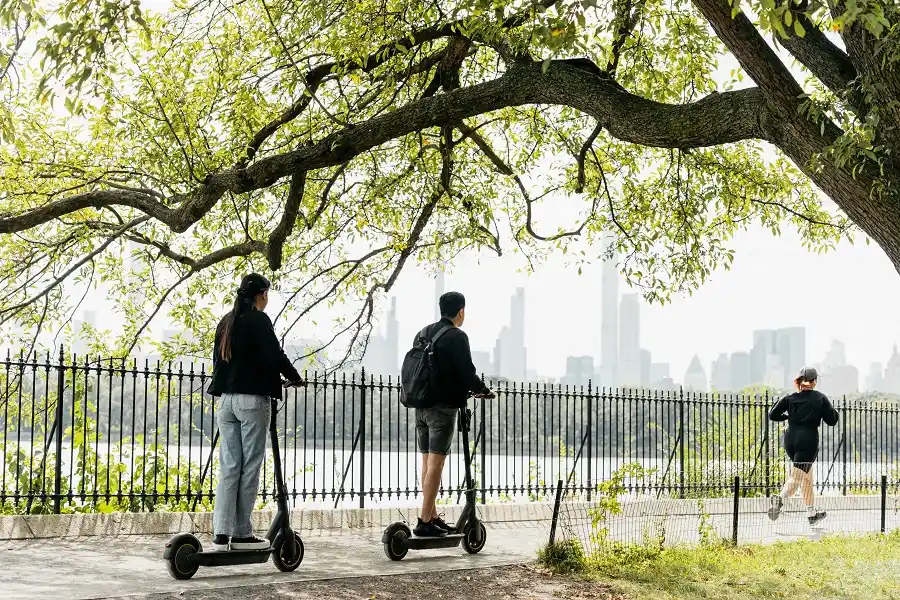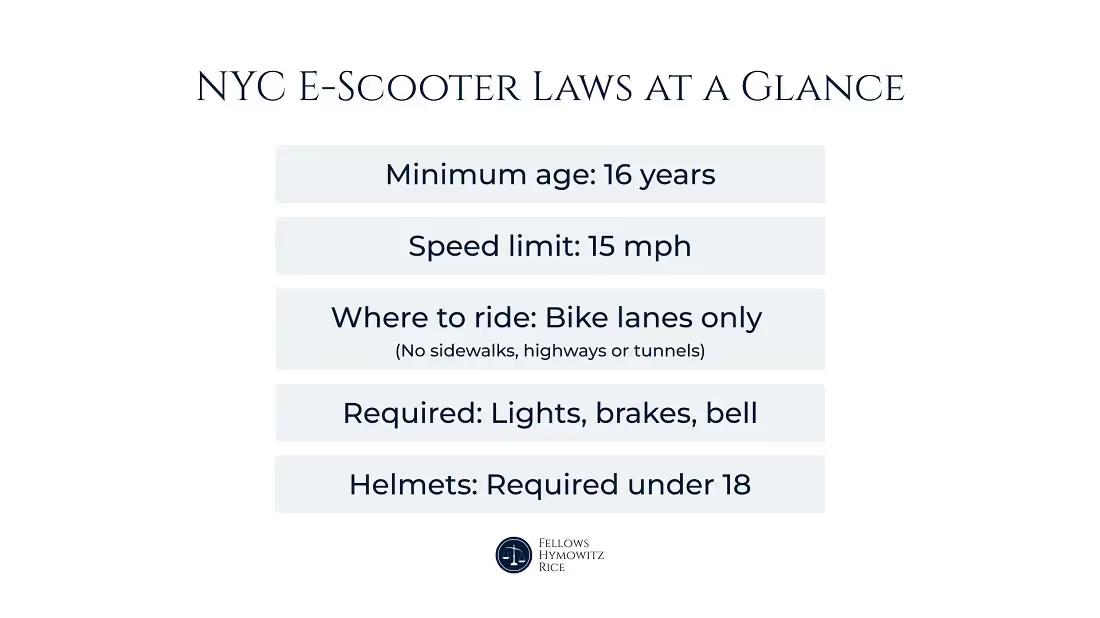Rob Fellows is a renowned personal injury attorney with over 40 years of experience. As managing partner at Fellows Hymowitz Rice, he is known for his meticulous preparation and aggressive advocacy in the courtroom.
In recent years, electric scooters have transformed mobility across New York City streets, offering an eco-friendly alternative to traditional transportation. As these zippy devices with their quiet electric motors continue to gain popularity, the regulations governing their use have evolved significantly.
At Fellows Hymowitz Rice, we've witnessed firsthand how the surge in e-scooter usage has impacted our communities. As New York State e-scooter accident lawyers with over 40 years of successfully handling accident cases, we've represented numerous clients involved in incidents while riding or encountering these increasingly common vehicles. The intersection of new technology and existing traffic regulations creates a unique legal landscape that affects everyone sharing our roads.
Let's explore the current NYC e-scooter laws as of 2025 and what they mean for riders and pedestrians alike.

Basic E-Scooter Riding Requirements in NYC
New York City has established clear guidelines for electric scooter operation within city limits. These rules aim to balance innovation in transportation with public safety concerns.
According to NYC Administrative Code §19-176.2:
- Age requirements: Riders must be at least 16 years old to operate electric scooters on public roads and bike lanes in NYC.
- Speed limits: Electric scooters in New York City are allowed to drive at a maximum speed of 15 mph. The NYS Vehicle and Traffic Law §1282(6) states: "No person shall operate an electric scooter in excess of fifteen miles per hour".
- Equipment standards: All e-scooters must be equipped with working brakes, lights, reflectors, and a bell or other audible signal device.
- Helmet usage: While helmets are not legally required for adults riding electric scooters, they are strongly recommended. However, riders under 18 must wear approved helmets according to NYC regulations.
- Registration and licensing: Unlike motor vehicles, electric scooters do not require registration with the DMV, and riders do not need a special license to operate them on NYC streets.
These basic requirements establish the foundation for lawful e-scooter usage, but the regulations extend further into how these vehicles interact with existing traffic systems.
Traffic Rules for E-Scooter Riders in New York City
When navigating New York City streets on an electric scooter, riders must adhere to specific traffic regulations that determine where and how they can operate their devices.
- Right-of-way adherence: E-scooter riders must yield to pedestrians at all times, particularly at crosswalks and intersections, as outlined in NYC Traffic Rule 4-07(c)(3).
- Bike lane usage requirements: When available, e-scooter riders should utilize bike lanes rather than sidewalks or vehicle lanes. Section 19-176.2(b) of the NYC Administrative Code states: "No person shall operate an electric scooter on a sidewalk".
- Traffic signal compliance: Riders must obey all traffic signals, stop signs, and road markings just as other vehicles do.
- Riding formation: When riding with others, e-scooter users must travel single file in bike lanes or on roadways, not side-by-side.
- Prohibited areas: Electric scooters are not permitted on highways, expressways, or in tunnels within New York City limits.

These traffic rules help integrate electric scooters into the existing transportation framework while minimizing conflicts with other road users. Failure to follow these regulations can result in citations and fines ranging from $25 to $250, depending on the violation and whether it's a first or repeat offense.
Additional Regulatory Aspects of E-Scooter Operation
Beyond the basic riding requirements and traffic rules, several other regulatory aspects govern e-scooter use in New York City:
Parking and Storage Regulations
When you're not actively riding your electric scooter, proper parking is mandatory. NYC Department of Transportation regulations specify that:
- E-scooters must be parked upright in designated areas where available.
- Riders cannot block sidewalks, building entrances, or accessibility ramps.
- Some neighborhoods have specific e-scooter corrals marked with distinctive signage.
Since late 2024, the city has installed over 200 dedicated e-scooter parking zones, and it plans to add 300 more by the end of 2025.
Nighttime Operation Requirements
Electric scooters used during low-light conditions face additional requirements:
- Front white lights visible from at least 500 feet ahead.
- Rear red lights visible from at least 300 feet behind.
- Side reflective materials for increased visibility.
Shared E-Scooter Services
For users of rental services like Lime, Bird, or NYC's own CityScoot program:
- Rental e-scooters are programmed to automatically limit speeds to 15 mph.
- Geo-fencing technology prevents operation in prohibited areas.
- Users must end rides in designated drop zones or face additional charges.
- Riders must be 18 or older to use shared services, regardless of the general 16-year minimum for privately owned scooters.
These regulations represent the city's attempt to balance convenient micromobility options with public safety priorities.
Common Dangers of E-Scooter Use in NYC
While electric scooters offer convenient transportation on New York City streets, they also present several safety concerns that riders should be aware of. Understanding these potential hazards can help you take appropriate precautions when operating an e-scooter:
- Vehicle collisions: Interactions with cars, truck collisions, and accidents involving buses, particularly at intersections and when crossing traffic lanes.
- Pedestrian conflicts: Encounters with pedestrians on crowded sidewalks or when pedestrians unexpectedly step into bike lanes.
- Dooring incidents: Risk of collision when vehicle occupants open car doors without checking for approaching e-scooters.
- Road surface hazards: Potholes, construction plates, uneven pavement, and debris that can cause falls.
- Weather conditions: Reduced traction and visibility during rain, snow, or icy conditions.
- Limited bike lane coverage: Many streets lack protected lanes, forcing e-scooter riders to share roads with larger vehicles.
- Battery issues: Problems related to improper charging or battery damage.
- Brake malfunctions: Reduced stopping ability due to worn or improperly maintained brakes.
- Visibility concerns: E-scooters' small profile makes them harder for drivers to spot, especially in low-light conditions.
Being mindful of these potential dangers and following all NYC e-scooter laws can significantly reduce your risk of accidents while riding electric scooters through the city.
E-Scooter Accidents and Legal Framework

Despite regulatory efforts, electric scooter accidents remain a significant concern on New York City streets. When incidents occur, understanding the applicable legal framework becomes vital.
- Liability determination: In e-scooter accidents, liability is determined based on New York's comparative negligence laws. Multiple parties may share responsibility, including riders, pedestrians, motor vehicle drivers, the e-scooter company, or even scooter manufacturers, if equipment failure contributed to the incident.
- Mandatory reporting: Accidents involving electric scooters that result in injury or property damage exceeding $1,000 must be reported to the police within 10 days under NY Vehicle and Traffic Law §605.
- Insurance considerations: Standard auto insurance policies typically do not cover e-scooter accidents. However, some homeowner's or renter's insurance policies may provide limited coverage for liability claims.
- Compensation recovery paths: Injured parties may seek personal injury compensation through various channels, including insurance claims or legal action. Valid claims might cover medical expenses, lost income, property damage, and pain and suffering.
- Time limitations: New York's statute of limitations generally allows three years from the date of an accident to file a personal injury lawsuit, but this timeline can vary based on specific circumstances. For example, a minor has three years from their 18th birthday to file a claim, and a family has two years from the date of death to file a wrongful death claim.
There have been many e-scooter accidents involving fatalities in NYC, where riders were struck by vehicles, and pedestrians were hit by e-scooter riders. One widely known case from 2021 involved the fatal hit-and-run accident of actress Lisa Banes. In that case, Ms. Banes was struck and killed by an e-scooter rider while crossing the intersection of Amsterdam Avenue and West 64th Street.
When facing the aftermath of an electric scooter accident, our personal injury and car accident attorneys provide valuable assistance in several ways. We use our 40+ years of experience to help victims deal with the complicated mix of traffic regulations and liability laws that apply to e-scooter incidents. Our team performs thorough investigations to gather evidence, identify all potentially responsible parties, and manage communications with insurance companies that may attempt to minimize compensation.
You’re Not Alone. You Have Options. Call Us.
Electric scooters, along with electric bicycles and electric skateboards, have become fixtures on New York City streets. As these devices grow in popularity, laws continue to adapt to balance transportation innovation with safety concerns.
Riders should stay informed about NYC e-scooter laws, adopt safe practices, and remain vigilant whether using human power or electric assist.
If you've been involved in an electric scooter accident in New York, proper legal guidance can protect your rights. At Fellows Hymowitz Rice, we handle these cases daily. Our personal injury attorneys can review your situation during a free consultation. Contact us today about your e-scooter incident on New York City streets and get honest advice on what can be done.

Get NYC E-Scooter Legal Rights Protection
Knowing your rights under current electric scooter laws is vital in case of an accident. Contact our attorneys at Fellows Hymowitz Rice for a free case evaluation today!
Contact Us
Heading
Lorem ipsum dolor sit amet, consectetur adipiscing elit, sed do eiusmod tempor incididunt ut labore et dolore magna aliqua. Ut enim ad minim veniam, quis nostrud exercitation ullamco laboris nisi ut aliquip ex ea commodo consequat. Duis aute irure dolor in reprehenderit in voluptate velit esse cillum dolore eu fugiat nulla pariatur.






